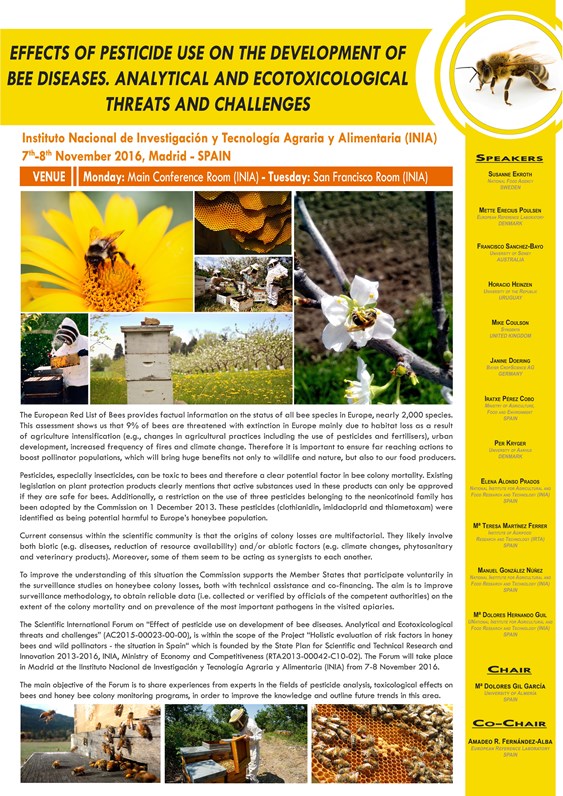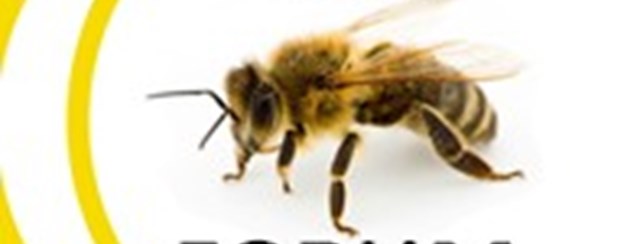Summary
EFFECTS OF PESTICIDE USE ON THE DEVELOPMENT OF BEE DISEASES-ANALYTICAL AND ECOTOXICOLOGICAL THREATS AND CHALLENGES CHALLENGES National Institute for Agricultural and Food Research and Technology, INIA. 7th- 8th November 2016
Content
National Institute for Agricultural and Food Research and Technology, INIA (7th- 8th Novembrer 2016)

Monday 7th November. Salón de Actos welcome
welcome
Mr. Manuel Laínez Andrés
Head of the National Institute for Agricultural and Food Research and Technology (INIA) Spain
Introduction by the Chair
Monday1SusanneEkroth
Monday1SusanneEkroth
Mrs. Susanne Ekroth
Chemistry Department. Science Division. National Food Agency
Monday2MettePoulsen_AmadeoRFernandez-Alba
Monday2MettePoulsen_AmadeoRFernandez-Alba
Mrs. Mette Erecius Poulsen(1)/Mr. Amadeo R. Fernández-Alba(2)
(1) European Union Reference Laboratory for Pesticide Residues in Cereals and Feeding Stuff. University of Denmark
(2) European Union Reference Laboratory for Pesticide Residues in Fruit & Vegetables. University of Almería
Monday3FranciscoSanchez-Bayo (1)
Monday3FranciscoSanchez-Bayo (1)
Mr. Francisco Sánchez-Bayo
Faculty of Agriculture & Environment. University of Sydney
Monday4HoracioHeinzen
Monday4HoracioHeinzen
Mr. Horacio Heinzen
Pharmacognosy & Natural Products. University of The Republic. Uruguay
16:20 – 16:40. Coffee Break
Monday5MikeCoulson
Monday5MikeCoulson
Mr. Mike Coulson
Syngenta Global. United Kingdom
Monday6JeanineDoering
Monday6JeanineDoering
Mrs. Jeanine Doering
Bayer CropScience AG. Germany
Monday7IratxePerez
Monday7IratxePerez
Mrs. Iratxe Pérez Cobo
Ministry of Agriculture, Food and Environment. Spain
Monday8PerKryger

Monday8PerKryger
Mr. Per Kryger
Danish Reference Laboratory for honey bee health. University of Aarhus. Denmark
17:40 – 18:00. Questions and Remarks
Tuesday 8th November. Sala San Francisco
Thuesday1ElenaAlonsoPrados

Thuesday1ElenaAlonsoPrados
Mrs. Elena Alonso Prados
Dirección Técnica de Evaluación de Variedades y Productos Fitosanitarios. National Institute for Agricultural and Food Research and Technology (INIA). Spain
Thuesday2MariaTeresaMartinezFerrer
Thuesday2MariaTeresaMartinezFerrer
Field studies to evaluate residues of neonicotinoids and other pesticides used in citrus and apple orchards related to bees and other pollinators: foliar treatment
Mrs. María Teresa Martínez Ferrer
Institute of Agrifood Research and Technology (IRTA). Spain
Thuesday3ManuelGonzálezNuñez

Thuesday3ManuelGonzálezNuñez
Mr. Manuel González Núñez
National Institute for Agricultural and Food Research and Technology (INIA). Spain
Thuesday4MD Hernando_Sergio Gil

Thuesday4MD Hernando_Sergio Gil
Mrs. María Dolores Hernando Guil(1)/ Mr. Sergio Gil Lebrero(2)
(1) National Institute for Agricultural and Food Research and Technology (INIA). Spain
(2) University of Córdoba, Spain
10:20 – 11:00. Coffee Break
11:00 – 13:00. Round Table
All Speakers
13:00 – 13:30. Conclusions and Farewell

